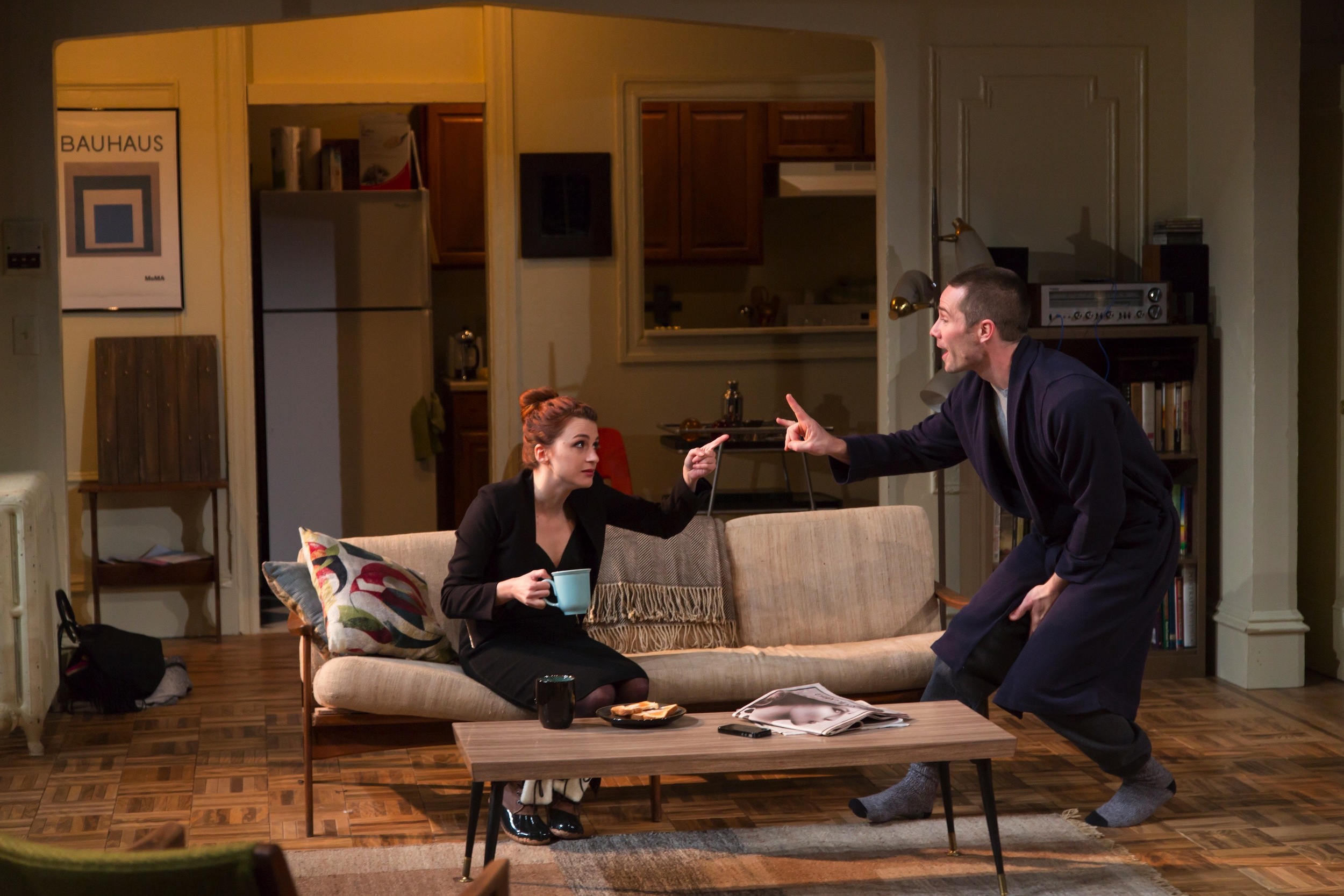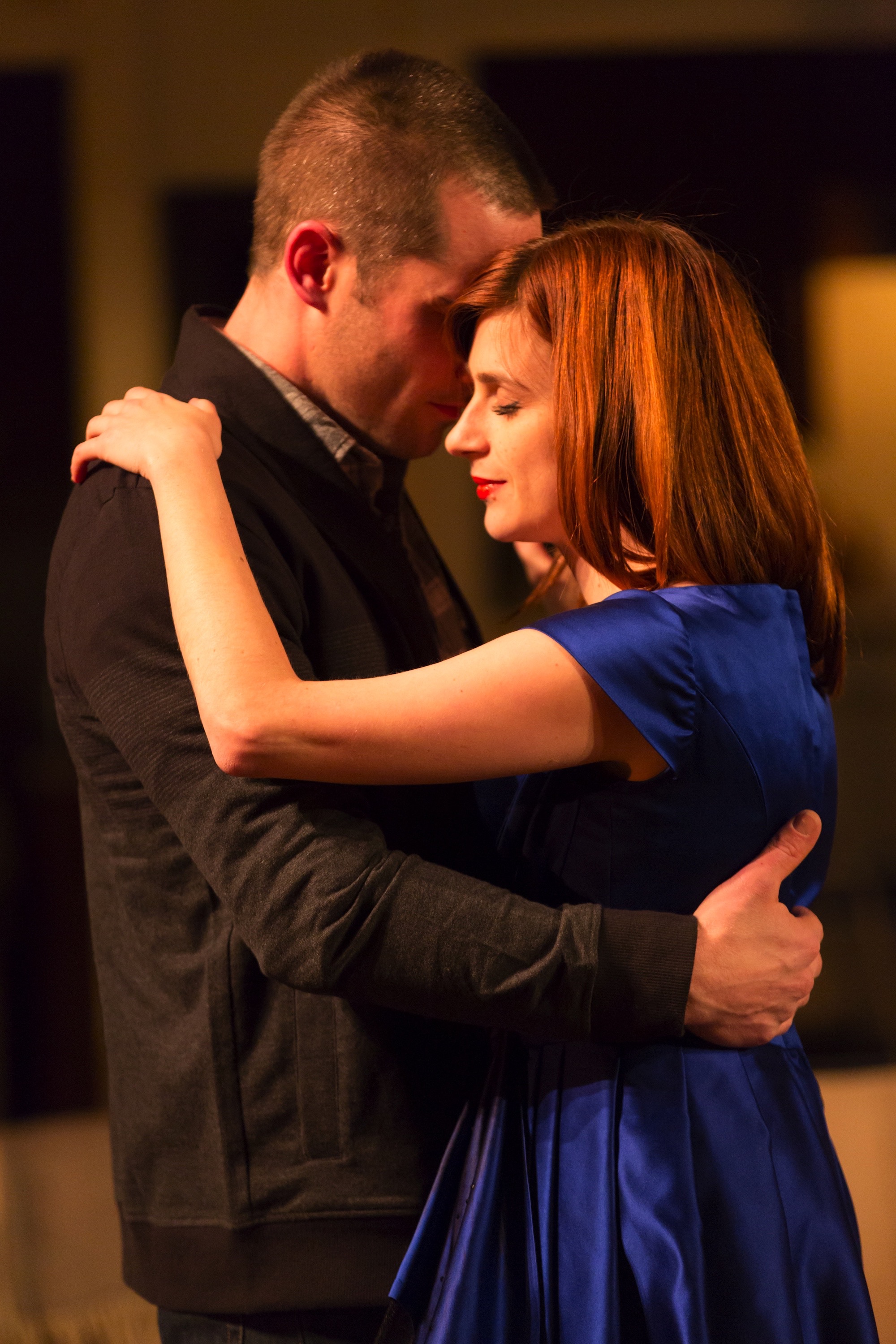Review of Romeo & Juliet at Hartford Stage
Scenic design is an integral part of the theater-viewing experience. It can be transformative; it can be unobtrusive; it can be a distinctively theatrical environment; it can seem like an actual place you could inhabit. The choices made to convey a play to us take on concrete shape with the set’s design and orientation.
Director Darko Tresnjak’s scenic design for the Hartford Stage’s production of Romeo & Juliet chooses to place “Shakespeare’s most popular play” (as the press packet reads) in a post-war Italy influenced by Neorealist filmmakers, such as Pasolini and de Sica, a decision that gives us a very austere setting, with a backdrop of vertical graves as in a mausoleum, with small vases tended now and then by attendants (one great virtue of this R&J is that it has a cast large enough to have extras). Gone is any sense of Italy's sensuality; in its place is a sterile, barren presence that never lets up.
Kaliswa Brewster (Juliet)
Worse, center stage is a pit of gravel. The first time boots tread across the space, accompanied by speech, we become aware of why this wasn’t such a good idea. Do we want our Shakespeare accompanied by noisy rocks and stones and worse than senseless things? After all, these characters aren’t speaking Italian with subtitles, nor are they speaking Fifties-ish lingo. They are speaking Elizabethan poetry, which, generally speaking, we like to hear as clearly as possible, unmarred by unnecessary sound effects. At one point, the pit seems intended as a swimming pool, with Mercutio (Wyatt Fenner) in flippers and bathing suit, and that does add a touch more color, incongruous as it might seem, to the drabness.
Wyatt Fenner (Mercutio), Alex Hanna (Benvolio), Chris Ghaffari (Romeo) and Ensemble
I could say more about the moving slab that becomes a balcony and the rising and lowering slab that becomes a marital bed for the lovers, but let’s just leave it at: unprepossessing. For some viewers these matters might mean less than nothing as they are transported to another world by their wonder at Shakespeare’s language and control of this very deft plot; I’m not of their number.
Kandis Chappell (Nurse), Chris Ghaffari (Romeo), Charles Janasz (Friar Laurence)
And that’s not due to the fact that this is an overly familiar play. Watching it, as with most Shakespeare plays, one is surprised that there’s always more to learn. Here, we learn how very important Friar Laurence (Charles Janasz) and Juliet’s Nurse (Kandis Chappell) are, because they are the two best performances in the show. Indeed, Janasz’s tongue-lashing to Romeo is only bettered by his woeful, at-wit’s-end explanation of what went wrong, addressed to a stern Escalus (Bill Christ) at the play’s close. And Chappell’s reactions, even when silent, speak volumes. Her face when she finally realizes Juliet is mourning more for Romeo than for Tybalt registers an almost frightened acknowledgement of youthful passion. The scene when she counsels giving up on Romeo and marrying Paris (Julien Seredowych) as Capulet (Timothy D. Stickney) commands is also fraught with a dissembling that speaks volumes about her underling status.
The principal roles are spottier. As Romeo, Chris Ghaffari is boyish and energetic, able to climb up to and down from the balcony slab with impressive ease, but any sense of Romeo as morose or lovesick—as he should be when we meet him—never materializes. And he’s much better at banter and challenge than he is at the passionate declarations required in the denouement. Kaliswa Brewster fares better as Juliet, swaying her Nurse with the passion of her love for Romeo and finding depth and tears in the “banished” speech, but she also has a tendency to proclaim earnestly more often than find a register that can carry her from pertness to pathos and back. Together they don’t really ignite, and their best scene has them lying on their sides, their body language expressing the yearning that’s stirring them.
Chris Ghaffari (Romeo), Kaliswa Brewster (Juliet)
And Mercutio? This time he’s more a nerd—with his pedal-pusher braces and bicycle—than a fop (the typical rendition), and Fenner knows how to deliver the poetry of his speech about Queen Mab, and that makes him a welcome addition here. The Montagues don’t have all that much to do, and, as Juliet’s parents, Thomas D. Stickney enacts fed-up anger well and Celeste Ciulla seems the most at home in the Neorealist trappings, looking like a Rosselini heroine, cigarette and all. Robert Hannon Davis, who plays Romeo’s stiff of a dad, makes more of an impression as a truly scary Apothecary, and Alex Hanna’s Benvolio is apt.
The best things about the look of the show are Ilona Somogyi’s costumes—Juliet’s go-to-be-shrived outfit is quite fetching—and Matthew Richards’ lighting design, which makes for some interesting effects against that somber, tomblike backdrop. The notion that Italy’s war dead serve as those fallen to Capulet vs. Montague intrigues is more suggestive than satisfactory, but the set’s sense of gloom does serve to underline all the misgivings and the willingness to die expressed often enough. This is a Romeo & Juliet where the couple’s brief flame of love seems a stray moment in an enduring culture of mourning. Doom’s the word.
William Shakespeare’s
Romeo & Juliet
Directed by Darko Tresnjak
Scenic Design: Darko Tresnjak; Costume Design: Ilona Somogyi; Lighting Design: Matthew Richards; Sound Design: Jane Shaw; Wig Design: Mark Adam Rampmeyer; Associate Scenic Deisgner: Colin McGurk; Dramaturg: Elizabeth Williamson; Fight Choreographer: Steve Rankin; Vocal & Text Coach: Claudia Hill-Sparks; Casting: Binder Casting; Productioin Stage Manager: Robyn M. Zalewski; Assistant Stage Manager: Brae Singleton; Production Manager: Bryan T. Holcombe; Associate Artistic Director: Elizabeth Williamson
Cast: Callie Beaulieu; Kaliswa Brewster; Michael Buckhout; Kandis Chappell; Bill Christ; Celeste Ciulla; Robert Hannon Davis; Jonathan Louis Dent; Wyatt Fenner; Chris Ghaffari; Alex Hanna; Olivia Hoffman; Charles Janasz; Raphael Massie; Stephen Mir; Ella Mora; Stephen James Potter; Jenna Rapisdara; Alex Schneps; Mac Schonher; Julien Seredowych; Timothy D. Stickney
Hartford Stage
February 11-March 20, 2016














